Researchers of the Month
Here are just some of the graduating seniors we will miss. ...We wish them all well
with their future endeavors and pursuits!
May 2016
Christy Au - Biochemistry Major - Research Mentor: Dr. Ed Luk, Biochemistry & Cell Biology
Katrina Haught - Biochemistry Major - Research Mentor: Dr. Kevin Czaplinski, Biochemistry & Cell Biology
Jennifer Imbrogno - Chemical & Molecular Engineering Major - Research Mentor: Dr. Tadanori Koga, Materials Science & Engineering
Daniel Irizarry - Biology Major - Research Mentors: Dr. Jennie Williams, Family, Population & Preventive Medicine, Medicine; Dr. Nancy Reich, Molecular Genetics & Microbiology
Michael Itzkin - Geology Major - Research Mentor: Dr. Daniel Davis, Geosciences
Platon Karpov - Physics & Astronomy Major - Research Mentors: Dr. Alan Calder, Dr. Abhay Deshpande, Physics & Astronomy
Asher Marks - Economics Major - Research Mentor: Dr. Azzimonti-Renzo, Economics
Brian Mazeski - English Major - Research Mentors: Dr. Justin Johnston, Dr. Douglas Pfeiffer, English; Dr. Abena Asare, Africana Studies
Parandis Nejati -Biology Major - Research Mentor: Dr. Stephen Walker, Oral Biology & Pathology
Shamin Sahebzada -Interdisciplinary Biology major - Research Mentor: Dr. Sharon Pochron, Sustainability Studies
Helen Xu - Computer Science & Applied Math Majors - Research Mentors: Dr. Michael Bender, Dr. Rob Johnson, Computer Science
Breanna Zavadoff - Atmospheric & Oceanic Sciences major - Research Mentor: Dr. Thomas Galarneau, National Center for Atmospheric Research in Boulder, Colorado
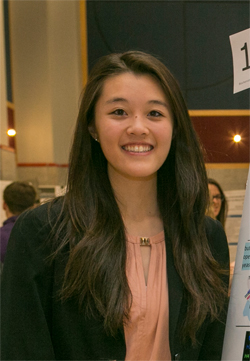
Christy Au is a Biochemistry major and Business Management minor from Rego Park, NY. She joined the Luk lab in April 2015 and has since been studying the principles of gene expression in eukaryotic cells. Christy recently presented a poster at the URECA poster symposium titled “Understanding how chromatin is remodeled during transcriptional initiation in Saccharomyces cerevisiae.” Her project investigates the role of the preinitiation complex in nucleosome eviction at promoters. Her contributions have given her coauthorship to an upcoming paper. She is a recipient of the Undergraduate Recognition Award for Academic Excellence and the Provost’s Award for Academic Excellence. Christy is also the co-founder and CTO of chromaFISH Corp., a platform for quantification of color change reactions using smartphone cameras. Bringing together her knowledge in chemistry and business management, she is leading the validation study in color quantification as well as building the company from the ground up. Following graduation, Christy will be taking a gap year before applying for graduate Ph.D. programs in a biochemistry-related field during which time she will be researching in New York City as well as continuing to build chromaFISH.
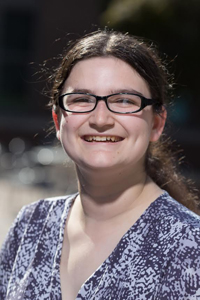 Katrina Haught is a Biochemistry major in the Women in Science & Engineering Program. She began
doing research in summer 2014 through the Explorations in STEM program (a URECA-Career
Center-Technology & Society program), working with Dr. Suzanne Scarlata in the Department
of Physiology & Biophysics. In Summer 2015, Katrina participated in the Cold Spring
Harbor Laboratory Undergraduate Research Program , working with Dr. Joshua-Tor to
investigate the interactions between the protein Argonaute and one of its binding
partners GW182. In her senior year, Katrina joined the laboratory of Dr. Kevin Czaplinski
in the Department of Biochemistry & Cell Biology, and conducted research on how back
signaling in pre-synaptic cells contributes towards localization of mRNA translation.
Katrina has been involved as a WISE Junior mentor and fundraiser, as a Conference
Assistant, a Residence Hall Association Senator and Hall Council President, and was
a member of BioElite. Katrina is a recipient of the Edward Mardovich Memorial Scholarship,
and the Finish in Four Scholarship, and was a recipient of the 2016 Provost’s Award
for Academic Excellence. Katrina is from New Milford, Connecticut and plans to pursue
a Ph.D. at Cornell University in Molecular and Cellular Biology.
Katrina Haught is a Biochemistry major in the Women in Science & Engineering Program. She began
doing research in summer 2014 through the Explorations in STEM program (a URECA-Career
Center-Technology & Society program), working with Dr. Suzanne Scarlata in the Department
of Physiology & Biophysics. In Summer 2015, Katrina participated in the Cold Spring
Harbor Laboratory Undergraduate Research Program , working with Dr. Joshua-Tor to
investigate the interactions between the protein Argonaute and one of its binding
partners GW182. In her senior year, Katrina joined the laboratory of Dr. Kevin Czaplinski
in the Department of Biochemistry & Cell Biology, and conducted research on how back
signaling in pre-synaptic cells contributes towards localization of mRNA translation.
Katrina has been involved as a WISE Junior mentor and fundraiser, as a Conference
Assistant, a Residence Hall Association Senator and Hall Council President, and was
a member of BioElite. Katrina is a recipient of the Edward Mardovich Memorial Scholarship,
and the Finish in Four Scholarship, and was a recipient of the 2016 Provost’s Award
for Academic Excellence. Katrina is from New Milford, Connecticut and plans to pursue
a Ph.D. at Cornell University in Molecular and Cellular Biology.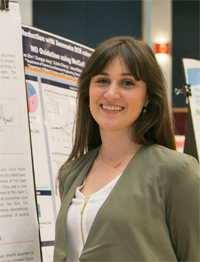
Jennifer Imbrogno is a member of the University Scholars program majoring in Chemical and Molecular
Engineering with a Japanese Studies minor, from Massaapequa, NY. She has been active
doing research on polymer thin films in Dr. Tadanori Koga’s lab in the Materials Science
Department since spring 2014. Jennifer participated in the URECA Explorations in STEM
summer program in 2014. She has presented her research at the URECA Research Fair
(twice), at admitted students day; and more recently, at an APS conference in San
Antonio in 2015. Jennifer was a TA for organic chemistry, a summer organic chemistry
instructor and a head undergraduate TA. She is a member of the American Institute
of Chemical Engineers, the American Chemical Society, as well as the American Physical
Society. Jennifer will be attending the University of Texas at Austin in the fall
to pursue a PhD.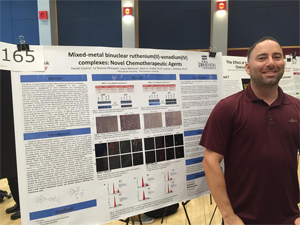 Daniel Irizarry is a Biology major who grew up on Long Island and worked for a decade in the construction
business prior to studying at Suffolk County Community College and Stony Brook University.
His first research experience was obtained through the Chancellor's Education Pipeline
Biomedical Research Award program at Stony Brook in 2013 offered through CESAME (now
the Institute of STEM Education), where he had the opportunity to work in the lab
of Dr. Nancy Reich. The following summer he participated in the Biology Participation
in Research and Education Program (BioPrep) during his first summer at Stony Brook,
this time working in the lab of Dr. Jennie Williams doing work on cancer and racial
health disparities. He has since continued working in Dr. Williams’ lab as an IMSD
student. Daniel has presented at the ABRCMS symposium in San Antonio Texas (2014)
as well as at the URECA annual symposium (2016). He is also a Collegiate Science
and Technology Entry Program (CSTEP) student, and a HEARST foundation mentor here
at Stony Brook. He enjoys basketball and volunteering in his free time; and as of
this month, spending time with his newborn son. He will be joining the Graduate program in Genetics at Stony Brook this fall.
Daniel Irizarry is a Biology major who grew up on Long Island and worked for a decade in the construction
business prior to studying at Suffolk County Community College and Stony Brook University.
His first research experience was obtained through the Chancellor's Education Pipeline
Biomedical Research Award program at Stony Brook in 2013 offered through CESAME (now
the Institute of STEM Education), where he had the opportunity to work in the lab
of Dr. Nancy Reich. The following summer he participated in the Biology Participation
in Research and Education Program (BioPrep) during his first summer at Stony Brook,
this time working in the lab of Dr. Jennie Williams doing work on cancer and racial
health disparities. He has since continued working in Dr. Williams’ lab as an IMSD
student. Daniel has presented at the ABRCMS symposium in San Antonio Texas (2014)
as well as at the URECA annual symposium (2016). He is also a Collegiate Science
and Technology Entry Program (CSTEP) student, and a HEARST foundation mentor here
at Stony Brook. He enjoys basketball and volunteering in his free time; and as of
this month, spending time with his newborn son. He will be joining the Graduate program in Genetics at Stony Brook this fall.
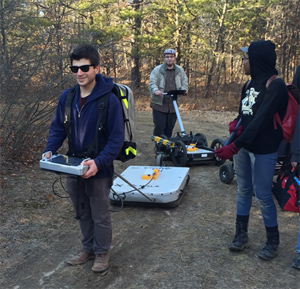
Michael Itzkin is a Geology major who has over the last year been involved in glacial and coastal
geological research under the guidance of Dr. Dan Davis (Geosciences). Utilizing ground
penetrating radar (GPR), Michael has been conducting a research project titled “A
GPR-Based Stratigraphic Analysis of Robert Moses State Park” that seeks to understand
the morphological and geometric changes that Long Island’s barrier island system has
undergone over time in response to storms and gradual environmental changes such as
rising sea level. Michael has presented his research in a talk at the Long Island
Geologist’s Conference and in an undergraduate thesis. In addition to his academic
work, he is also a resident assistant in Sanger College and an undergraduate college
forever fellow for the undergraduate college of Arts, Culture, and Humanities. In
the fall, Michael will be heading to the University of North Carolina – Chapel Hill
to pursue a Ph.D. in geology.
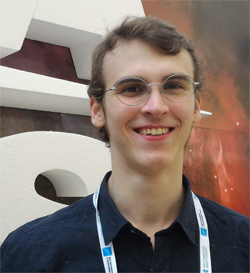
Platon Karpov is the recipient of this year’s John S. Toll Prize which annually recognizes a graduating
senior in physics/astronomy. At SB, Platon has been active with the SBU Astronomy
Club which helps facilitate Astronomy Open Night events, the Society of Physics Students
at SBU; and was inducted into Sigma Pi Sigma. Platon joined the research group of
Dr. Abhay Deshpande as a freshman to work on a magnetic cloaking device project. In
summer 2014, Platon then joined the computational nuclear astrophysics group of Dr.
Alan Calder where he worked on simulating Type Ia supernovae to see how different
properties of the progenitor white dwarf stars influence the brightness of the events.
This work was supported by the SUNY RF-funded Explorations in STEM program in summer
2014. In his junior year, Platon continued working in the Calder group, where he worked
to provide tools to correct observational data for neutron star atmospheres, and also
began collaborations with a colleague at the Los Alamos Laboratory on developing a
radiation transfer code; his research in summer 2015 was supported by URECA. In 2015-2016,
Platon was selected as an intern for the NSF-funded Blue Waters Project at the National
Center for Supercomputing Applications, a program that promoted a year-long commitment
on a computational science project utilizing the petascale Blue Waters supercomputer
at the University of Illinois at Urbana-Champaign. Platon has participated three times
in the annual URECA poster symposium; and was recently recognized with honorable mention
in the Chambliss Astronomy Achievement Award at the 227th AAS Meeting. Platon will be pursuing a PhD in astrophysics at UC Santa Cruz following
a summer internship on Parallel Computing at the Information Science and Technology
Institute at Los Alamos National Laboratory. Prior to starting his undergraduate studies at SB, Platon Karpov had immigrated as
a high school student to the US from Russia without any knowledge of English.
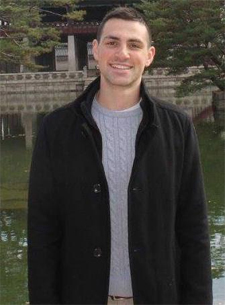
Asher Marks is a senior majoring in Economics, from New Jersey. At SB, Asher has been very active on campus as an Associate Justice for the Undergraduate Student Government and Treasurer of Hillel Student Club. Studying abroad last semester in Hong Kong, Asher's studies focused on the trade and development of Asia and China’s rise on the world stage. Asher will be starting his career as a Financial Analyst for the Federal Reserve Bank of New York this coming summer. He is looking forward to using his research skills that he has acquired from working with his mentor, Prof. Marina Azzimonti-Renzo, to analyze monetary policy and distressed debt analysis. Asher presented his thesis project, "Externalities of Cyber Intrusions and the Apathy of Share Holders" at the recent URECA Celebration on April 27th.
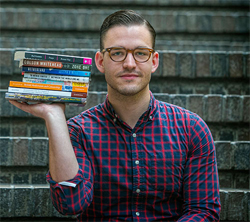
Brian Mazeski is a member of the University Scholars program who majors in English, with a minor in Writing and Rhetoric. He is completing an honors thesis project entitled, “Manhattan Projects: U.S. Imperialism and the Politics of Humanity in Contemporary New York Literature” (faculty advisors: Dr. Justin Johnston, English; Dr. Abena Asare, Africana Studies), which examines how two New York novels--Colson Whitehead's Zone One and Joseph O'Neill's Netherland--invite us to think postcolonially about New York City (a city largely absent from postcolonial discourse), and about the exclusive definitions of “the human” it manufactures. Brian has been involved as a tutor and Assistant Director with the SBU Writing Center, and is a co-editor of The Torch, The University Scholars Newsletter. He has served as a communications intern with the Dean of Students office suite, and as Vice President/Treasure of the SBU StandUP Charter Against Bullying and Homophobia, and has also participated in Trans-Awareness: The Transgender Experience, Building Your Gay-Straight Alliance, Red Watch Band Training, and SBU Safe Space Training. Brian has published articles about Arthur Miller and James Joyce in the Arthur Miller Journal and Mind Murals, and presented at the Graduate English Conference, as well as the URECA/English Department colloquium this past April. Brian is also a recipient of the 2016 Provost Award for Academic Excellence, and has been previously featured on the SBU website : http://sb.cc.stonybrook.edu/happenings/student-spotlight/for-english-major-brian-mazeski-16-life-imitates-art-and-vice-versa/?=marquee4
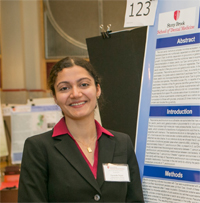
Parandis Nejati is a Biology major and Chemistry minor in the Honors College. Since the fall of her sophomore year, she has been working in Dr. Stephen Walker's lab on oral bacterial symbiosis and its implications in disease. Parandis has presented her work at the 2014-16 URECA Celebrations, the Leo Sreebny dental research day, and the William Paterson University Undergraduate Research Symposium. This research will also be the subject of her honors thesis and presentation. Parandis has been involved as Vice President of SBU's Pre-Dental Society, an Honors College Big Sibling, Alternative Spring Break Outreach volunteer, dental clinic volunteer, Undergraduate Biology Student Advisory Board member, and an Undergraduate Teaching Assistant for organic chemistry labs. She is the administrator of the Dental Fun Fact of the Week Facebook page, where she posts about dental research findings in an effort to promote science communication and public awareness of oral health. She is a member of the Phi Beta Kappa and Sigma Beta honor societies, recipient of the 2016 Provost's Award and Undergraduate Recognition Award for Academic Excellence, and winner of the 2015-16 Iranian-American Scholarship Fund undergraduate award. Parandis will be attending Stony Brook School of Dental Medicine starting August 2016 and hopes to integrate her passion for research and communication into patient care.
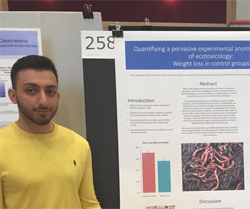 Shamin Sahebzada is an Interdisciplinary Biology major with a minor in Ecosystems and Human Impact.
After transferring to Stony Brook University, Shamin joined the Sustainability Studies
Earthworm Ecotoxicology Lab to raise his awareness of human environmental impact.
Under the mentorship of Dr. Sharon Pochron, he has successfully quantified the deleterious
effects of herbicides, heavy metals, and fertilizer on earthworms and soil microorganisms.
Throughout his three years of involvement, Shamin has learned to be a leader that
not only plans and coordinates experiments, but also serves as a friend and mentor
to his academic peers. Shamin has presented his research multiple times at the URECA
symposium, the Earthstock Environmental Student Research Exhibition, and the New York
Marine Science Consortium. With his experience writing research articles and tutoring
at Stony Brook University’s Writing Center, Shamin continually strives to enhance his
ability to effectively communicate science for the public. He is a two-time awardee
of the Sustainability Studies Undergraduate Research Award; and a recipient of the Undergraduate
Recognition Award for Academic Excellence. As a first generation college student,
Shamin plans to further his education by pursing a Master’s in Public Health with
a focus in Epidemiology, followed by a Ph.D. Ultimately, he seeks to reduce suffering
through understanding of the distribution, determinants, and control of illness.
Shamin Sahebzada is an Interdisciplinary Biology major with a minor in Ecosystems and Human Impact.
After transferring to Stony Brook University, Shamin joined the Sustainability Studies
Earthworm Ecotoxicology Lab to raise his awareness of human environmental impact.
Under the mentorship of Dr. Sharon Pochron, he has successfully quantified the deleterious
effects of herbicides, heavy metals, and fertilizer on earthworms and soil microorganisms.
Throughout his three years of involvement, Shamin has learned to be a leader that
not only plans and coordinates experiments, but also serves as a friend and mentor
to his academic peers. Shamin has presented his research multiple times at the URECA
symposium, the Earthstock Environmental Student Research Exhibition, and the New York
Marine Science Consortium. With his experience writing research articles and tutoring
at Stony Brook University’s Writing Center, Shamin continually strives to enhance his
ability to effectively communicate science for the public. He is a two-time awardee
of the Sustainability Studies Undergraduate Research Award; and a recipient of the Undergraduate
Recognition Award for Academic Excellence. As a first generation college student,
Shamin plans to further his education by pursing a Master’s in Public Health with
a focus in Epidemiology, followed by a Ph.D. Ultimately, he seeks to reduce suffering
through understanding of the distribution, determinants, and control of illness. 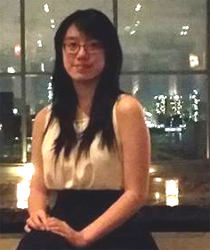
Helen Xu is a Computer Science and Applied Math major in the Women in Science and Engineering
(WISE) program, from Scarsdale NY. She started with research in the spring of 2013
under Professor Michael Bender in the CS department in external memory algorithms
and various other questions in theoretical CS. Last summer Helen was at Sandia National
Labs working on the application of data structures to for security purposes and cryptographic
algorithms under Dr. Tom Kroeger and continued that work with Professor Rob Johnson
in CS over the past year. Her current work is on the intersection of randomization
and I/O-efficient algorithms, which will continue into the summer at Sandia Labs in
New Mexico. She will be starting a Ph.D. program at MIT in Computer Science in the
fall, with support from the department in conjunction with a NPSC fellowship for graduate
study.
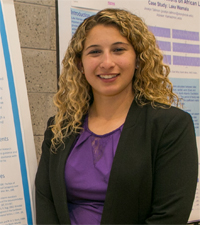
Breanna Zavadoff is an Atmospheric and Oceanic Sciences major on the Meteorology Track, from Hicksville,
NY. During the summer of 2015 Breanna participated in an 11-week internship at the National
Center for Atmospheric Research in Boulder, Colorado where she studied tropical cyclone
development in the southwest Caribbean Sea. Breanna has presented her research on
campus at the URECA Celebration as well as at the 2016 Northeastern Storms Conference
and the 96th Annual American Meteorological Society Student Conference. Breanna has
been a member of the Meteorology Club since freshman year and for the past three years
she has been a member of the Women's Rugby Club team, serving as treasurer, president
and, most recently, team captain. Breanna was a recipient of the Petra M. Udelhofen
Memorial Scholarship in 2014, was inducted as a member of Phi Beta Kappa in 2015 and
received the Provost’s award for Academic Excellence this past month. In the Fall,
Breanna will be attending the University of Miami to pursue a Ph.D. in Meteorology
and Physical Oceanography.
Below are excerpts of their conversations with Karen Kernan, URECA Director.
Karen. What advice about research do you have for other undergrads?
Jennifer: My advice for an undergrad looking to start in research is to find a professor you’re
comfortable with and who will allow you to be as independent as possible and grow.
What’s most important is that you are enthusiastic about going into lab and working
toward your goal.
Katrina. The most important lesson I learned from working in a lab environment is that it's
okay to reach out and ask questions or ask for help. Many students are afraid of looking
silly or incompetent in front of their colleagues, but in reality most scientists
will see your curiosity and dedication to doing things correctly as a great asset.
Brian: For doing a senior thesis project, I think everybody has one first idea that they
are excited about and then realize that it’s either unmanageable or too big or already
been done. That happens a lot. One of the useful things about being a part of the
honors program in English is that you take a research class the semester before, which
helps you prepare by producing an abstract, 6-7 pages of close reading, and a bibliography
before you even start writing the thesis. Also, you need to recognize when to stop
researching and brainstorming topics and when to start writing. And most importantly,
you need to find a topic that you like and that you are interested in and care about.
That happened for me, and things kind of fell into place. I’ve been reading and writing
about New York City, which is fun for me, and has a special meaning because I grew
up there, in Queens.
Parandis: In our lab, we are investigating the biochemical and nutritional dependence between different oral bacterial species. We have recently discovered that oral bacteria can actually rely on each other for survival and that this dependence is a likely culprit behind gum disease! By studying these symbiotic relationships, our research goal is to better understand disease etiology and ultimately to customize treatment for periodontal disease and dental caries. My work in the lab will help me care for my future patients as a dentist.
Breanna. Over the summer I was able to participate in an immersive research internship at Boulder. I was taken from someone who had no background in research – and thrown in to an environment where I was surrounded by resources and peers that were helpful, and enabled me to hit the ground running. I was given research to do and taught how to do it. I was given a workshop how to write a scientific paper (do a lit review, data & methods, discussion). It was A LOT to learn in 11 weeks . We were taught how to present our work to a wide audience, not just people with atmospheric science backgrounds….Being able to immerse yourself in a summer internship program and not have the distraction you have when you’re taking courses allows you to give 110% to your research. It lets you open your mind to absorb that knowledge. … If I hadn’t had that summer research experience, I don’t think I would be as prepared for going into graduate school. But having this background makes me feel a lot more comfortable and ready.
Karen. What have you learned from your interactions with your mentor and colleagues in your lab?
Shamin. From Dr. Pochron, I‘ve learned a lot about research, and gained a lot of real life skills: how to interact with people in a professional setting, how to work together to accomplish your goals, and how not to give up. From doing research, you learn how to ask the right questions, and how to set goals and plan. As you strive to achieve your goals, you realize that even if you fail (and most of the time we fail!)— you have to re-try and rethink the problem and go and do it again.
Daniel. My mentor has really been huge in helping me get to this point. I wound up in Dr. Jennie Williams’s lab through the Bioprep program and she sort of took me under her wing. Without her, I wouldn’t have realized any of these opportunities available to me or how to navigate this path. My parents didn’t go to college. And even though science was always interesting to me, I never thought I could be a scientist. That seemed far off, something that I couldn't have imagined happening. Dr. Williams was instrumental in helping me understand the process of what it means to be a scientist, what you need to do to get there, and what kind of job opportunities are available.
Karen. What's your favorite aspect of doing research?:
Asher. My favorite part of doing research is taking some situation that you hear about, dissecting the
problem into individual challenges, and then using any and all means at your disposal
to either analyze why that specific problem is occurring or possible solutions to
the issue. The ability to conduct effective research enables me take what we are told
as facts and to derive conclusions on my own from the results of my analyses.
Helen. While there's still so much I don't know, so far I've enjoyed the process of forming
ideas and testing them, whether through proofs or experiments. I like that it involves
a lot of different skills - both technical and communicative.
Platon. I like that it’s pushing the boundaries of human knowledge and I’m able to participate
in that process. Starting in my freshman year, at a relatively early age, I’ve been
able to delve into a very professional field that I didn’t qualify for at first but
was able to build myself up for ... Just studying from the books is not enough. You
need to know how to apply it.
Michael. By doing research, I was able to explore my interests in focused areas of geology to a level that exceeded what could have been covered in a classroom. Fieldwork is a major component of geological research and by getting involved in this research I had the opportunity to do a large amount of fieldwork as well as hands on experience using varying geophysical tools.
Christy. Before doing research, I never fully appreciated the amount of work that went into the
science we are taught in class. I now sit through class thinking about what techniques
may have been used and wonder which ones could be employed to further study the matter.
During research, there is no sure-fire way of solving a problem. You try and try again
until you arrive at a conclusion. While it may take awhile, the journey there teaches
you just as much.
